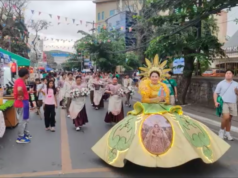“Military encampment in schools, day care centers, barangay halls, and other public places in the community disrupts farming and other livelihood activities. Some farmers are afraid to go to their fields for fear of being accused as members of NPA,” Amihan chairperson Zen Soriano said in a statement.
Soriano noted that the human rights group Karapatan has recorded 36,620 individuals who have been deprived of the use of schools, medical, religious and other public places because of military occupation in various parts of the country, especially in Mindanao.
Soriano said that their local chapter in Panay reported that the military implemented a curfew from 4 p.m. to 4 a.m. and threatened the villagers of being shot at if they are found outdoors during the curfew.
“Cases where military personnel conducts inspection on food and other products brought by the farmers and the ransacking of houses and stealing of farmers’ chickens and crops by military and paramilitary personnel are common woes from the peasantry. There are also incidents where military personnel oblige farmers to go to the military camps for interrogation and force farmers to surrender as NPA members,” Soriano added.
She claimed that “military encampment interrupts the operation of schools and day care centers and open up entire communities to a wide array of human rights violations.”
“At least 39 Lumad schools have already closed due to different forms of threat and harassment. Since April 2015, Lumad children in Southern Mindanao have been holding classes in evacuation centers after soldiers have encamped in their communities and their schools were forced to close while over a hundred have been holding classes in UP Diliman since August 2017.
“The desperate attempt of the Armed Forces of the Philippines and the Duterte administration to eliminate insurgency through its program Oplan Kapayapaan makes the farmers and the indigenous people vulnerable to red-tagging and attacks,” Soriano said.
From July 2016 to September 2017, Karapatan has documented 421,833 individual victims of forced evacuations in Sarangani, Compostela Valley, Maguindanao, Agusan Del Norte, Samar, Batangas, Abra, Quirino, Nueva Vizcaya and other provinces mostly in Lumad communities.
In Calbiga, Samar, around 1,000 villagers were forced to evacuate when the 87th Infantry Battalion of the AFP camped at their village.
Farmers were accused of being members of the NPA and were coerced to act as the military’s guide in the hinterlands during combat operations.
“We believe that the widespread militarization and rise in human rights abuses against our fellow farmers is an effort of the Duterte government to protect the interests of landlords and compradors. Most cases of abuses are in areas where large “development” projects of mining corporations and agro-corporations operate or about to operate with opposition from farmers and indigenous peoples,” Soriano said.
The peasant women group cited the recent aerial strikes in Batangas where the Canadian-owned Mindoro Resource Limited (MRL) Gold and Egerton Gold, both affi liated with the Australian miner Red Mountain Mining are seeking to extract gold in Lobo and the resource rich island of Mindanao.
Karapatan has documented 98 political killings from August 2016 to September 2017, 91 of whom are farmers, while 17 are women.
Soriano also said women and children are especially vulnerable to harassment in the hands of military and paramilitary groups.
Local chapters of Amihan reported that as a counter-insurgency measure of the AFP, military forces court daughters and relatives of leaders in the community to pacify their struggle for land.
Some women had children with military personnel but were left without financial support as they found out that the military personnel involved were already married.
There have also been reports of military personnel committing rape, harassment and child abuse, she added.
“Until now, no one was held accountable among the military and paramilitary groups involved in human rights violations and military encampment remains in peasant and Lumad communities,” Soriano said.
“Farmers are not aspiring for a luxurious life. We only wanted a simple and peaceful life. We are defending our land and our life. Hindi kayo nakakatulong, nanggugulo pa kayo. Lumayas kayo sa aming mga komunidad!,” Soriano also said.




